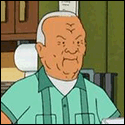|
Xealot posted:gently caress, I forgot how much that line stabs you when she says it. Because yeah, it's 100% correct and speaks so succinctly to how well Faye understood Don. Also, "you'll be married in less than a year." Ugh, Faye was great, gently caress you Don. S1, S3, S6 chat Faye feels like a modern woman transplanted into the 1960s. Her sensibilities are decades beyond her contemporaries, both male and female. I think that's one of the reasons she is attractive not just to Don, but to the audience. We want Don to be with her not just for what it would mean for Don's character, but also what it would mean for the show. We want the characters to move beyond their constraints, whether self-imposed or societal, and Faye's continued presence in the show might have moved things for all the characters in a positive direction. Of course, I might just be talking out of my rear end. I'm gaga for Cara Buono The Klowner fucked around with this message at 02:50 on Feb 24, 2021 |
|
|
|

|
| # ? Apr 18, 2024 22:05 |
|
The Klowner posted:S1, S3, S6 chat nah you're not wrong. Faye symbolized the idea of character growth. And my god I was pissed when Don dumped her. It made me like the show less, because I thought it would just be an unending cycle of Don not growing and not suffering for it. Man I was wrong.
|
|
|
|
GoutPatrol posted:S4 and S5 chat "You Only Live Twice" as the music cue for it is perfection.
|
|
|
|
Prince Myshkin posted:"You Only Live Twice" as the music cue for it is perfection. That song is just amazing in its own right too. I hadn't seen "You Only Live Twice" the movie before so the song was completely alien to me. The best musical cue in the show is the string pluck right between "Are you alone?" and "And love is a stranger..." Haunting, seductive, and maddening because you know that's the very moment Don decides to throw away everything he's worked towards the past two seasons
|
|
|
|
The Klowner posted:That song is just amazing in its own right too. I hadn't seen "You Only Live Twice" the movie before so the song was completely alien to me. The best musical cue in the show is the string pluck right between "Are you alone?" and "And love is a stranger..." Haunting, seductive, and maddening because you know that's the very moment Don decides to throw away everything he's worked towards the past two seasons Fun fact the version used in the movie is cut from like four different takes Nancy Sinatra did, they had originally wanted Frank to do the theme but he suggested she do it, she was so nervous she kept making mistakes.
|
|
|
|
Yoshi Wins posted:Yeah, I agree with all this, and there are a couple of things I'd like to add. Back to S4 chat: It's also important to think about Faye and Megan's respective interactions with Don's kids, given his weird relation with maternal figures in his life. Faye is incredibly uncomfortable when she is forced to deal with Sally turning up unexpectedly at Don's office, speaking to her in a patronizing way the entire time and admitting to Don after the fact that she was not ready for that interaction. Megan, meanwhile, doesn't bat an eye at being forced to spend a week with all three kids in California, immediately turning them into the Von Trapps, engaging with them and treating them respectfully. When Bobby and Sally knock over a milkshake squabbling at lunch, Don's temper flares and Megan doesn't bat an eye; just a spill, no big deal, which seems to serve as his big catalyst for proposing that evening, having seen her in an active caring, nurturing mode. (Also, not crying over literal spilled milk is the least Betty-like response possible. Don's anger in that moment feels more like a conditioned response to meet Betty's attitude at something being "ruined.")
|
|
|
|
JethroMcB posted:Back to S4 chat: It's also important to think about Faye and Megan's respective interactions with Don's kids, given his weird relation with maternal figures in his life. Faye is incredibly uncomfortable when she is forced to deal with Sally turning up unexpectedly at Don's office, speaking to her in a patronizing way the entire time and admitting to Don after the fact that she was not ready for that interaction. If I recall correctly, Faye even scolds him and has a slight meltdown in that moment due to the fact that she (most likely incorrectly) thought having Sally at work was a planted test from Don
|
|
|
|
S7 spoilers Maybe Faye wasn't the right person for Don, but finding someone was never his problem. His problem was his internal cauldron of self hatred and regurgitated avoidance mechanisms. Do people think that retreat in Cali helped him with that? That bit where he hugs the other guy was so loving powerful.
|
|
|
|
Shageletic posted:S7 spoilers Maybe Faye wasn't the right person for Don, but finding someone was never his problem. His problem was his internal cauldron of self hatred and regurgitated avoidance mechanisms. Do people think that retreat in Cali helped him with that? That bit where he hugs the other guy was so loving powerful. S8 spoilers Don hugs him because he gives him the idea for the coke ad op
|
|
|
|
The Klowner posted:S8 spoilers Don hugs him because he gives him the idea for the coke ad op I think itís more than that.
|
|
|
|
Shimrra Jamaane posted:I think itís more than that. Didn't Weiner say that the ending is a Rorschach test? Either you think the Coke ad is Don's tribute to the institute and the genuine change he had there, or you think he's cynically co-opting the aesthetic because ultimately he's just an ad man?
|
|
|
|
The Klowner posted:S8 spoilers Don hugs him because he gives him the idea for the coke ad op this cynicism is destroying my soul
|
|
|
|
live with fruit posted:Didn't Weiner say that the ending is a Rorschach test? Either you think the Coke ad is Don's tribute to the institute and the genuine change he had there, or you think he's cynically co-opting the aesthetic because ultimately he's just an ad man? Itís both to me. He had a genuinely enlightening moment......and then used it to come up with the ad idea. Thatís his whole deal.
|
|
|
|
Advertising is more meaningful for Don than it is for other people. Remember the Hershey pitch? He connected with Hershey's brand intensely as a kid because that was the closest thing he had to feeling loved. In the season 1 episode where they discuss the ironic Volkswagen "Lemon" ad, Don says he hates it. He prefers to make ads like the Glo-Coat commercial. Something that plays on the viewers' emotions. To most of us, the idea of connecting with a Coke ad is, at best, laughable, if not outright pathetic. But it is genuinely meaningful to Don. The monologue by Leonard (the man he hugs) helps Don see that we are all alone. We are alone together. It's not just Don that's alone. Everyone is longing for some kind of connection that we can't exactly define. So Don makes an ad that tells people, "If you drink a Coke, you'll have that connection." It's sort of dark and sad, because Coke is poison-water that you spend money on. But the ending is also kind of uplifting because Don had to learn to accept his flaws and make some peace with his past trauma to be able to make that ad. It's perfect because the series had to end on an ambiguous note. Anything definitive would have felt phony.
|
|
|
|
live with fruit posted:Didn't Weiner say that the ending is a Rorschach test? Either you think the Coke ad is Don's tribute to the institute and the genuine change he had there, or you think he's cynically co-opting the aesthetic because ultimately he's just an ad man? It's such an interesting question. I do think Don felt something there, and Don was more open about his mistakes (while not being specific about them, lol) to his call with Peggy than he ever has. My personal canon is that Don came back, wrote the Ad, and is super into superficial "hippie" "let's all get along" language before he marries his third wife and quite possibly divorces her in 5 years.
|
|
|
Prince Myshkin posted:It very obviously is and you're relying on people not actually having seen it to make your argument. Fun Fact: France banned the movie because they were afraid that too many people would join the army after watching the movie. Also https://twitter.com/MadMenQts/status/1364511843071459328
|
|
|
|
|
imdb posted:This film was banned in France for its negative portrayal of the French army. Switzerland also banned the film (until 1978), accusing it of being "subversive propaganda directed at France." Belgium required that a foreword be added stating that the story represented an isolated case that did not reflect upon the "gallantry of the French soldiers." imdb posted:French authorities considered the film an offense to the honor of their army and prohibited its exhibition in France until 1975. In Germany it wasn't allowed to be shown for a couple of years after its release to avoid any strain in relations with France.
|
|
|
|
I mean, the movie Truffaut discusses is literally "Paths of Glory" which I why I chose it. quote:Siskel: Thereís very little killing in your films. How come? quote:[Siskel] thought about Truffautís words for weeks, and is finally beginning to understand and agree with the observation, that Stanley Kubrickís 1957 film Paths of Glory isnít so much anti-war as it is critical of the French governmental institutions that lead people into war. Siskel concludes: ďWar isnít hell; itís just the men who run them are frequently hellish.Ē People are also being very smoothbrained, going "Well what about [Redacted]" to the point where it looks like a CIA document, which is fine, but I discussed that later seasons do a better job and that while my critique extends beyond this point I'm specifically criticizing the show up until the point we are in the thread.
|
|
|
|
Shageletic posted:It's such an interesting question. I do think Don felt something there, and Don was more open about his mistakes (while not being specific about them, lol) to his call with Peggy than he ever has. It is important to me and my understanding that Peggy, the person that likely understands Don more than any other living person, is distressed and has the impression that something is seriously wrong with Don. She didn't realize, and Don probably didn't either, that he was on the cusp of actual change.
|
|
|
|
Sash! posted:It is important to me and my understanding that Peggy, the person that likely understands Don more than any other living person, is distressed and has the impression that something is seriously wrong with Don. She didn't realize, and Don probably didn't either, that he was on the cusp of actual change. Yeah, Peggy usually shuts his poo poo down, and it was genuinely impactful when she stood up and said ď... I donít think you should be alone right now.Ē
|
|
|
|
Sash! posted:It is important to me and my understanding that Peggy, the person that likely understands Don more than any other living person, is distressed and has the impression that something is seriously wrong with Don. She didn't realize, and Don probably didn't either, that he was on the cusp of actual change. was it a cusp of change, or the cusp of suicide? Draper has always had a suicidal streak, from his tarot card reading, to his looking for emptiness, to driving a car completely loaded. maybe she was afraid he was finally going to do it? Maybe he was finally going to do it?
|
|
|
|
Shageletic posted:was it a cusp of change, or the cusp of suicide? Draper has always had a suicidal streak, from his tarot card reading, to his looking for emptiness, to driving a car completely loaded. maybe she was afraid he was finally going to do it? Maybe he was finally going to do it? He says that he's calling her because he realized he never said goodbye to her. If someone called me sounding really depressed and said that, I would act on the assumption that they were suicidal.
|
|
|
|
Yoshi Wins posted:He says that he's calling her because he realized he never said goodbye to her. If someone called me sounding really depressed and said that, I would act on the assumption that they were suicidal. Yeah Anyone have a link to the goon tviv review site? I think i used to write reviews for mad men and id love to see how, past the bad writing, how i felt about this stuff at the time
|
|
|
|
Siteís not up anymore unfortunately 
|
|
|
|
VinylonUnderground posted:I mean, the movie Truffaut discusses is literally "Paths of Glory" which I why I chose it. The interviewer brings up Paths of Glory and Truffaut responds about Kubrick in general. That interview is from 1973, right after A Clockwork Orange, considerably more violent than Paths of Glory. I frequently agree with Siskel but not here. The depiction of violence isn't what one would even use to argue the movie is insufficiently anti-war; it's the insistence the condemned men showed bravery in battles we haven't seen!
|
|
|
|
In any case being an anti-institutional film set in a time of war when wars are the product of institutions seems to me like drawing a distinction without a difference. Kirk Douglas' colonel is our square-jawed hero, a man with a keen sense of justice, completely idealized ó and he can't do poo poo. He's stymied at every turn. A liberal movie that wanted to claim there are no bad wars, just bad individuals would have included his triumph over the forces of evil.
|
|
|
|
Prince Myshkin posted:In any case being an anti-institutional film set in a time of war when wars are the product of institutions seems to me like drawing a distinction without a difference. Kirk Douglas' colonel is our square-jawed hero, a man with a keen sense of justice, completely idealized ó and he can't do poo poo. He's stymied at every turn. A liberal movie that wanted to claim there are no bad wars, just bad individuals would have included his triumph over the forces of evil. Whoa whoa whoa! Make sure you put how WWI ends in spoiler brackets.
|
|
|
|
What do you think about Come and See?
|
|
|
|
VinylonUnderground posted:Whoa whoa whoa! Make sure you put how WWI ends in spoiler brackets. don't be a dick
|
|
|
|
Also, entirely possible, Truffaut was a gross womanizing rear end in a top hat who thought he was the greatest thing in film and his intelligentsia opinions need to be viewed in that light. Making the argument that no matter how a war is portrayed it'll always be "pro war" has less to do with the film itself and more with how some parts of society are so jazzed up for the idea of killing in the name of the state for honor things like nuance and subtlety have no meaning for them. Taking that into consideration to claim even an anti-war film promotes war is meaningless. I'm not seeing how the argument is different from any fictional books that portray war in a negative light. If all it takes is a spectacle to enthrall someone to think war=good I question the value of that person's opinion counting for anything.
|
|
|
|
Escobarbarian posted:What do you think about Come and See? I haven't seen it so I can't comment. But so what if it is? Let's say Come and See is an anti-war film. What does that have to do with what I've said? I specifically choose the "you can't make an anti-war film" because it is an extremely common argument that most people are going to be familiar with and I chose the textbook example. My thesis is not "you can't make an anti-war film" nor "you can't condemn wealth and philandering in a TV show". I think that Mad Men specifically fails at condemning wealth and philandering because Weiner venerates wealth and philandering. I think this veneration shows through quite clearly in the finished product even though Weiner expressly seeks to condemn these things. Kubricks love of violence:Paths of Glory::Weiner's love of wealth and philandering:Mad Men Truffaut states that Kubrick likes violence very much so he glorifies violence in Paths of Glory despite his attempt to condemn it. I'm stating that Weiner loves wealth and philandering so he glorifies these things in Mad Men despite his attempt to condemn it. That's all.
|
|
|
|
UNRULY_HOUSEGUEST posted:You have repeatedly said moments like Don disgusting his mistress by urging her to help him bail on his entire life and family is 'sad trombone' (or 'sad dog', whatever the gently caress that is) plotting; only the moments where he has sex, gains money or lands a business deal count. I've got a feeling that any example of how Don being deeply flawed and pathetic throughout, and how that's inextricably linked with the his positive moments, is going to be written off as a sad animal or brass instrument, but gently caress it, I think I can talk about what appeals to me about Mad Men, and mostly implying what I don't care for in Breaking Bad, without totally making GBS threads over the thread. Because I do think that great TV needs to succeed at what it sets out to do, and I do think that Mad Men, for all its own flaws, succeeds.
|
|
|
|
VinylonUnderground posted:I haven't seen it so I can't comment. But so what if it is? Let's say Come and See is an anti-war film. What does that have to do with what I've said? Do you think Irrťversible is a pro rape movie?
|
|
|
|
CharlestheHammer posted:I actually agree that Don is very much do a thing then feel bad about how sad he is. It wouldnít be so bad if the show wasnít so formulaic about it but mad men runs into the problem a lot of the prestige television shows where you can see how TV it is coming from a mile away.
|
|
|
|
One of those posts provided examples and performed a close reading and one did not.
|
|
|
|
Why should we care about Don's cowardice? As I mentioned in the post that kicked this all off, it's very W's America. Look at Max Cleland and John Kerry then compare them to Saxby Chambliss and W. In that sense, humanizing Don with his self-indulgent "emptiness" is loving evil. We even see Don have the chance to start everything over again where he will succeed again. So what if Don runs away from NYC with a new woman to where ever? He's going to be able to make himself again and again and again. He the ultimate self-made man because he's constantly remaking himself.
|
|
|
|
UNRULY_HOUSEGUEST posted:...that's not why it's placed specifically in the slipstream of 60s history where postwar prosperity and white male supremacy as a given are going to have their first actual crisis moment... Just emphasizing this part. If Matt Weiner wanted to make a show about a cool, hyper-masculine badass who clowns on libs and feminists or whatever, he could've done that and set it in 2007. He could've cast Gerard Butler in some kind of Suits-esque business dramedy and made...whatever that show would be. He made a show set in the 60's because he wanted to say something about the dominant culture of that time, especially with respect to gendered power and the capacity for "successful" men to behave like Don unchallenged. It'd be like making a show about decadent rich people, and setting it in 1928. The message probably would not be that it's cool and fun to be rich. JethroMcB posted:Back to S4 chat: When Bobby and Sally knock over a milkshake squabbling at lunch, Don's temper flares and Megan doesn't bat an eye; just a spill, no big deal, which seems to serve as his big catalyst for proposing that evening, having seen her in an active caring, nurturing mode. (Also, not crying over literal spilled milk is the least Betty-like response possible. Don's anger in that moment feels more like a conditioned response to meet Betty's attitude at something being "ruined.") This was absolutely what sealed it in Don's mind, I'd think. Megan being so unlike Betty in that moment. If he externalizes the problems with his first marriage to Betty, his immature ex-wife, he doesn't have to look within. "This time, I'm making the right choice!" Which is a thought he voices out loud in S5, "if I'd met [Megan] first, I'd have known not to throw it away." And, I mean, Betty *is* an immature and often spiteful person, who behaves more like a child than an adult. But that's way down the list of reasons that marriage failed, and isn't why his marriage to Megan fails. The "are you alone?" scene hurts me specifically because it's so heartless...he's writing Megan off the way he probably wrote off Betty, after one mildly disillusioning interaction. Megan asked him to pull some strings for an acting job, and now she's (literally) a fake princess posing on a fake set, some cloying artificial construct of romantic bliss that Don flees to go drown his sorrows. Megan's not who he thought she was. We never see what Don and Betty's marriage looked like when it was "happy," which at some point it must have been. But we see it decay with Megan in realtime, and it's a loving downer.
|
|
|
|
Xealot posted:Just emphasizing this part. If Matt Weiner wanted to make a show about a cool, hyper-masculine badass who clowns on libs and feminists or whatever, he could've done that and set it in 2007. He could've cast Gerard Butler in some kind of Suits-esque business dramedy and made...whatever that show would be. He made a show set in the 60's because he wanted to say something about the dominant culture of that time, especially with respect to gendered power and the capacity for "successful" men to behave like Don unchallenged. season 5 chat: season 5 is so good
|
|
|
|
Season 5 is the best one.
|
|
|
|

|
| # ? Apr 18, 2024 22:05 |
|
All of them are the best one
|
|
|




























